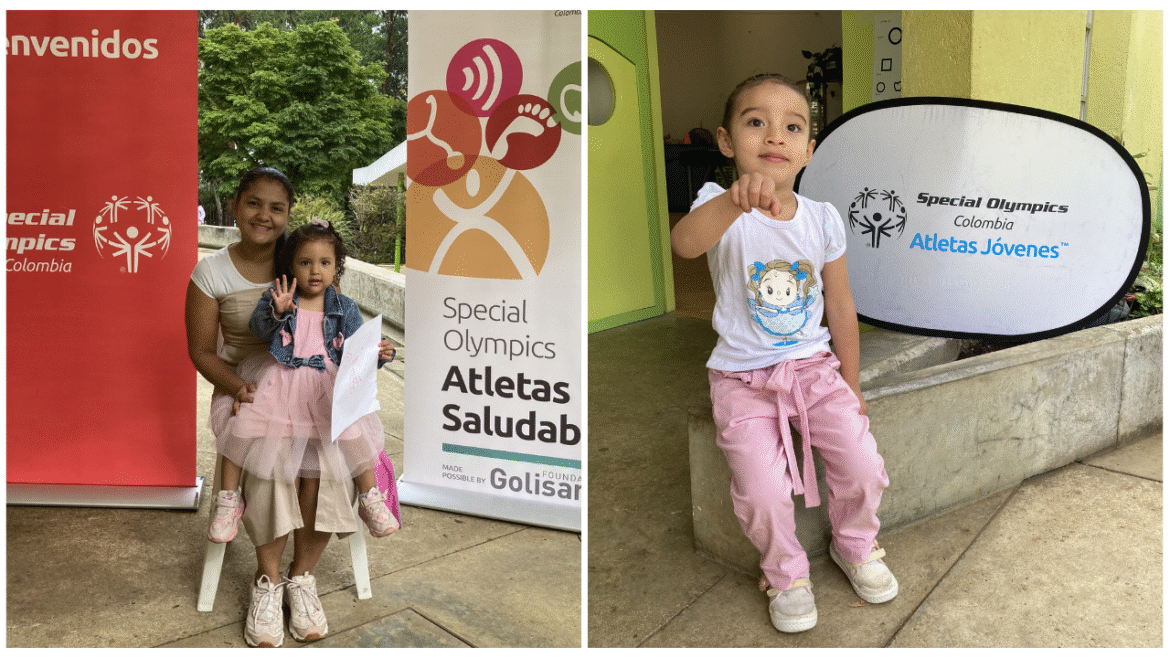Recognized annually on 20 November, World Children’s Day brings awareness to children’s rights and welfare worldwide. Established by the United Nations, World Children’s Day is an opportunity to reflect on and take action for the rights of all children, including their rights to health and education.
This World Children’s Day, Special Olympics is showcasing how early screenings and timely care can make a difference in a child’s health and wellbeing, especially in underserved communities.
Today, we’re sharing the stories of Emma and Saray: two Special Olympics Young Athletes who attended one of Special Olympics Colombia’s first-ever Special Olympics Healthy Young Athletes screenings.
Emma Chavarria and Saray Pérez Bedoya – Special Olympics Colombia – Healthy Young Athletes

In 2025, Montecarlo Kindergarten, a preschool in Medellín, Colombia, held its first-ever Healthy Young Athletes screening, marking a milestone for the Special Olympics Colombia Program. Healthy Young Athletes, the pediatric discipline of Special Olympics Healthy Athletes®, provides medical and developmental screenings for children ages 2-7 years old with and without intellectual and developmental disabilities (IDD). Two Healthy Young Athletes screenings were held at the preschool in June and September, bringing together nearly 60 children with and without IDD.
Among the children screened were Emma Chavarria, age 2, and Saray Pérez Bedoya, age 3, who participate in Special Olympics Young Athletes, an inclusive early childhood play program for children with and without IDD. Emma and Saray were thoughtfully selected by the preschool’s special educator and psychologist, who prioritized students showing early signs of developmental concerns that had not been formally discussed with their families. While neither Emma nor Saray have received a formal IDD diagnosis, both receive special education and psychological support to address delays in communication and language, thinking, reasoning, and problem-solving.
Accessing pediatric and multidisciplinary care has become a challenge due to the ongoing transition surrounding Colombia’s health reform. This has resulted in long wait times and delays for appointments and authorizing evaluations, often leaving children and their families without timely care. Additionally, many health professionals are unfamiliar with the unique health care needs of children with IDD and the necessary adaptations to address those needs.
Programs like Healthy Young Athletes aim to address these gaps by offering free health screenings to children ages 2-7 years old with and without IDD. Healthy Young Athletes is a comprehensive medical screening, including vision, hearing, and dental disciplines, developmental surveillance, and a physical examination. It also serves as a unique training opportunity for pediatric healthcare providers to build hands-on experience and learn best practices of caring for children with IDD.
Healthy Young Athletes also provides an opportunity to educate and empower parents and caregivers to better support their child’s growth and development. The screening can be implemented across schools and communities – as well as in conjunction with large-scale Healthy Athletes events. Following the screening, if a child needs a more comprehensive evaluation or community support, the program works to connect the family with local resources and clinical providers so the child can get the help they need.

Early childhood is a critical period for intervention. Health screenings like Healthy Young Athletes help detect delays and undiagnosed comorbidities that commonly occur in children with IDD. During the Healthy Young Athletes screening, both Emma and Saray received physical, vision, hearing, and dental screenings as well as developmental screenings of their language and communication, fine and gross motor skills, cognitive abilities, and social-emotional development.
Emma’s screening revealed signs of an overactive bladder, one of many health issues that may be overlooked in children with IDD. Emma and her family received recommendations for healthy urination habits and a non-urgent referral for follow-up care to help address the condition and improve Emma’s overall quality of life.
As for Saray, while moving through the different screening stations, it was discovered that she had difficulty hearing. Children with developmental disabilities are more likely to have reduced hearing than those without developmental disabilities. Saray’s screening also indicated a possible language disorder and gastroesophageal (acid) reflux, conditions that could lead to difficulties in the future if left untreated. Saray was referred for speech therapy, pediatric care, and an urgent audiology evaluation.
While each child’s needs were different, both experiences highlight the same truth: early detection and follow-up care open the door to identifying and treating children at-risk for comorbidities that commonly occur in children with IDD. Through Healthy Young Athletes, both Emma and Saray received specialized screenings that investigated their needs across many areas of health and development. Participating in the screening helped empower their families and caregivers to better support their child’s growth and development by connecting them to community resources and local healthcare providers.
Healthy Young Athletes builds pathways to care that help children with IDD thrive by creating a bridge to essential community services and local healthcare providers trained to care for their unique needs. For Emma, Saray, and the many other children who participated in the health screening, the impact of early detection can help identify health concerns and lead to better long-term outcomes.
Special Olympics understands the importance of supporting children and families as early as possible. To get connected with your local Program, access health information, and build a plan of care for your child, download the free Special Olympics Young Athletes App on Google Play or Apple today.
